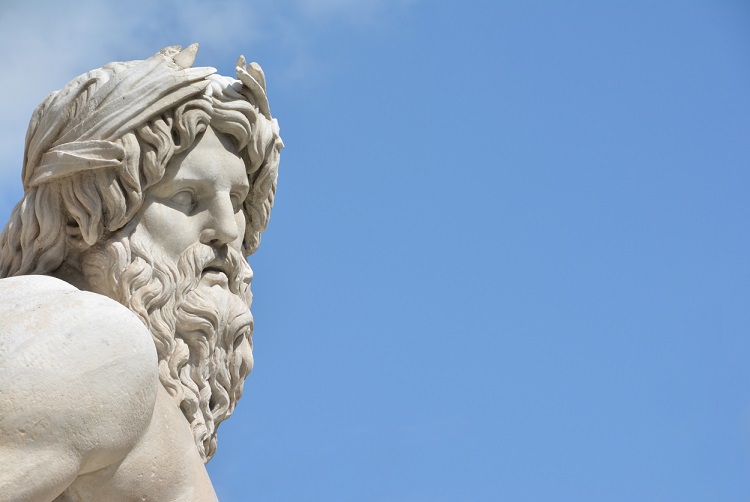
Here comes the sun...
The Romans liked a God or two.
In fact, 67 or so give or take a few that were in and out of fashion until the Emperor Constantine decided to place his faith in just the one ahead of a winner takes all battle against rivals.
By all accounts he had a vision that saw a script that read: “In Hoc Signo Vince” – or “In this sign, conquer”.
Quite a few of the 14 conductors here in Malmo will be looking for the same divine intervention when they open the score to Joel Thoor Engstrom’s 'Aurora' set-work for the Championship Section on Friday afternoon.
Dawn streak
Aurora was strictly a mid-table God in terms of the Premier League of Roman deities.
The table topper of the 12 ‘Dii Consentes’ (major Gods) was Jupiter – the God of the Sky and Thunder. Aurora on the other hand had the job of waking up at dawn to streak across the heavens announcing the arrival of her brother, Sol, the Sun God.
What she for the rest of the day nobody quite knows, but perhaps bored of her repetitive heavenly life she took a mortal lover, who unlike her, aged in immortality. She eventually turned the poor chap into a cicada.
She did this dressed in robe of saffron, opening the gates to the morning with her rosy fingers before riding a chariot, said to led by two pink or white horses, traveling across the sky from East to West.
What she for the rest of the day nobody quite knows, but perhaps bored of her repetitive heavenly life she took a mortal lover, who unlike her, aged in immortality. She eventually turned the poor chap into a cicada.
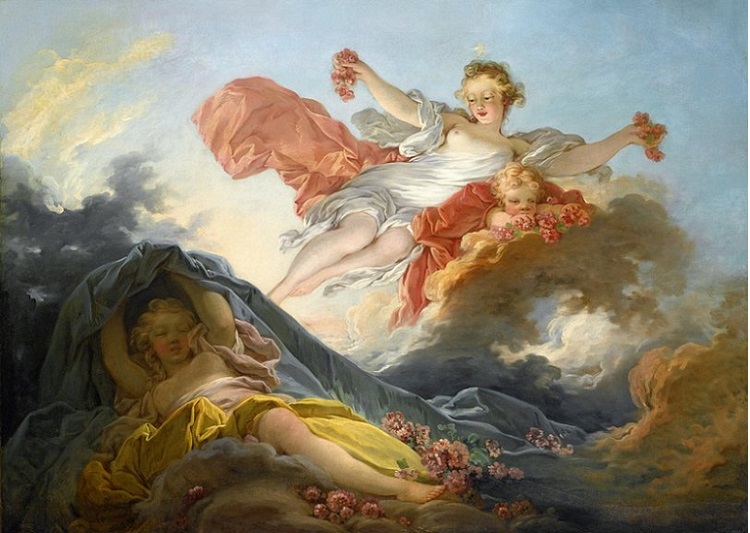
The heavens awake...
Symbolism
Joel Thoor Engstrom’s engaging 18-minute composition is inspired by Aurora’s symbolism rather than character traits - evoking the mystery as well as majesty of the bringer of renewal and joy, the comforter of better times ahead during the darkest hours of the night.
Think of waking up to a day of ELO’s ‘Mr Blue Sky’ after an evening of Leonard Cohen.
Thee parts
The work is structured in three distinct but joined parts; the unstable scene-setting opening followed by the growing busy activity of early morning Roman life.
A central ‘kindling of light’ warmly settles in place as the day unfolds, eventually giving way to a ‘festive song of praise’ finale, packed with free flowing, childlike optimism.
A central ‘kindling of light’ warmly settles in place as the day unfolds, eventually giving way to a ‘festive song of praise’ finale, packed with free flowing, childlike optimism that itself heralds a race to enjoy the last embers of the sun before Aurora’s moon sister, ‘Luna’ is seen to settle in the sky.
It all starts (below) in the ether of pre-dawn; glimpses of light breaking through a thick mist ready to be burned off by the arrival of the blazing golden orb in the heavens. It is slow and mysterious – the percussion (with the help of a rubber ‘superball’ rolled across a timpani head, a scraped tam-tam and tinkling crotales) setting the scene.
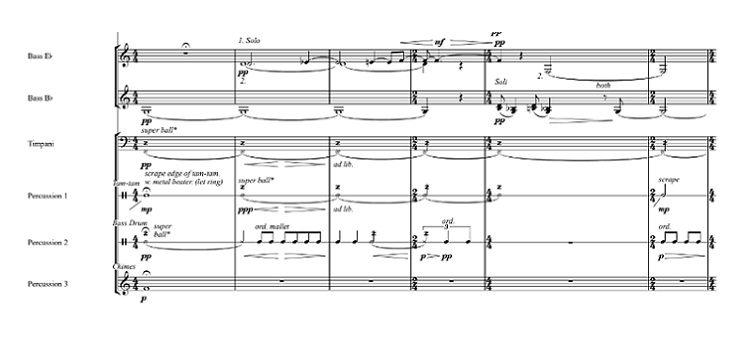
Magnetic fields
An early indicator of the composer’s thematic development (motif ‘twists and turns’ formed by what the composer describes as harmonic “magnetic fields”) is heard in the muted trombones in the following Vivace section.
This has a sprightly semi-quaver underpinning that grows in incremental pace (132/142/144/152), drama and purpose – fleet of foot but light of dynamic touch.
That said, Aurora’s horses galop with an oddly gaited stride at times.
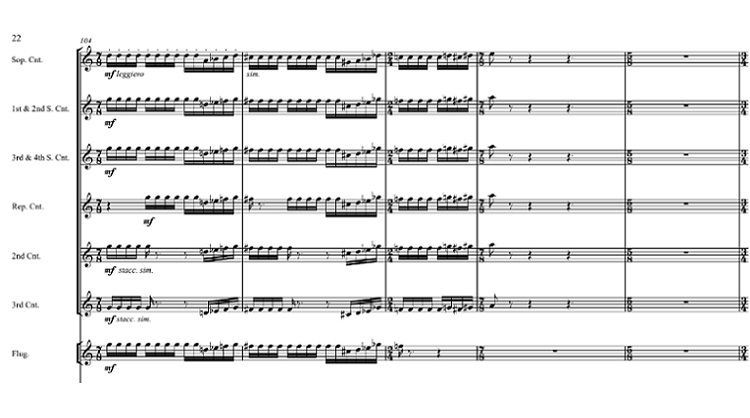
It sounds like the Norse God Odin’s eight legged Sleipnir at full pelt (above). However, its dislocated meter (with just a hint of sardonic Swedish humour in its driving ABBA’esque ‘money, money, money’ semi quaver lines?) is written with clarity and precision in the uncluttered scoring (as it is throughout) before reaching its ferocious stopping point.
It’s a like the Norse God Odin’s eight legged Sleipnir at full pelt with its dislocated meters (with just a hint of sardonic Swedish humour in its driving ABBA’esque ‘money, money, money’ semi quaver lines?)
There, a moment’s silence greets an afternoon of relaxed expression which unfolds with ‘soli’ unison leads enhanced by solo cameos from soprano to vibraphone.
None are overextended in length or needless virtuosity, each drawing into the other to keep the music flowing with tasteful rubato. The climaxes are sonorous, but certainly not bombastic or overblown, finally passing through different lead voices to the solo cornet on a libero cadenza (below) of simple tranquil settlement.
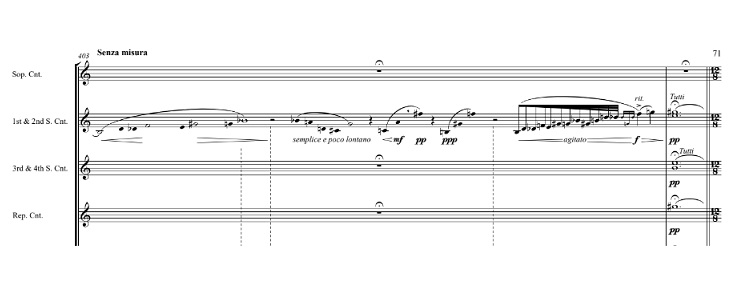
Spirited finale
The spirited finale comes as little bit of a surprise; the dark minor chord undercurrents even in that afternoon sun replaced by all things bright, bubbly (marked 132) and compound. The youthful vigour is obvious; jubilant and nippy, the clear scoring with its clever percussion writing adding texture and colour.
The youthful vigour is obvious; jubilant and nippy, the clear scoring with its clever percussion writing adding texture and colour.
The impending sense of the joyfulness ending as the moon begins to rise is obvious though; the pace increasing almost exponentially, fevered, agitated and finally ecstatic – the final snatch of sunshine grabbed at an alarming 182 sprint finish.
Iwan Fox
The Composer:
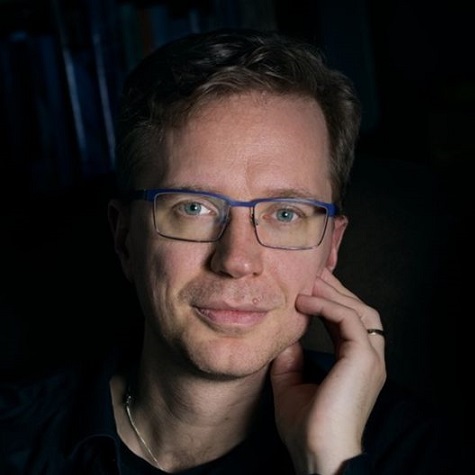
Swedish composer Joel Thoor Engström (1987) is based in Stockholm, whose works for orchestra, choir and chamber ensembles to solo compositions and opera are characterised by colourful expressions in rhythm and harmony.
He is influenced by both the neo-classical French tradition following Debussy and Ravel all the way to electronica, experimental fusion and progressive chiptunes.
For many years he played in a brass band and later studied composition at the Royal College of Music in Stockholm with Mats Larsson Gothe, Per Mårtensson and Henrik Strindberg.
He was a finalist in the European Composer Competition in Belfast in 2006 with his work, ‘Odyssey’, and since them his works have been performed nationally and internationally by artists such as Norrköping Symphony Orchestra, the Swedish Radio Choir, Baltic Youth Philharmonic, Royal Swedish Army Band and ensemble recherche.
He has composed several chamber operas, the latest ‘Om Männinskan’ (About man) which premiered at the Folkoperan in Stockholm in 2019.
Joel is also a teacher of music theory, ear training and composition at Lilla Akademien Music School in Stockholm.













